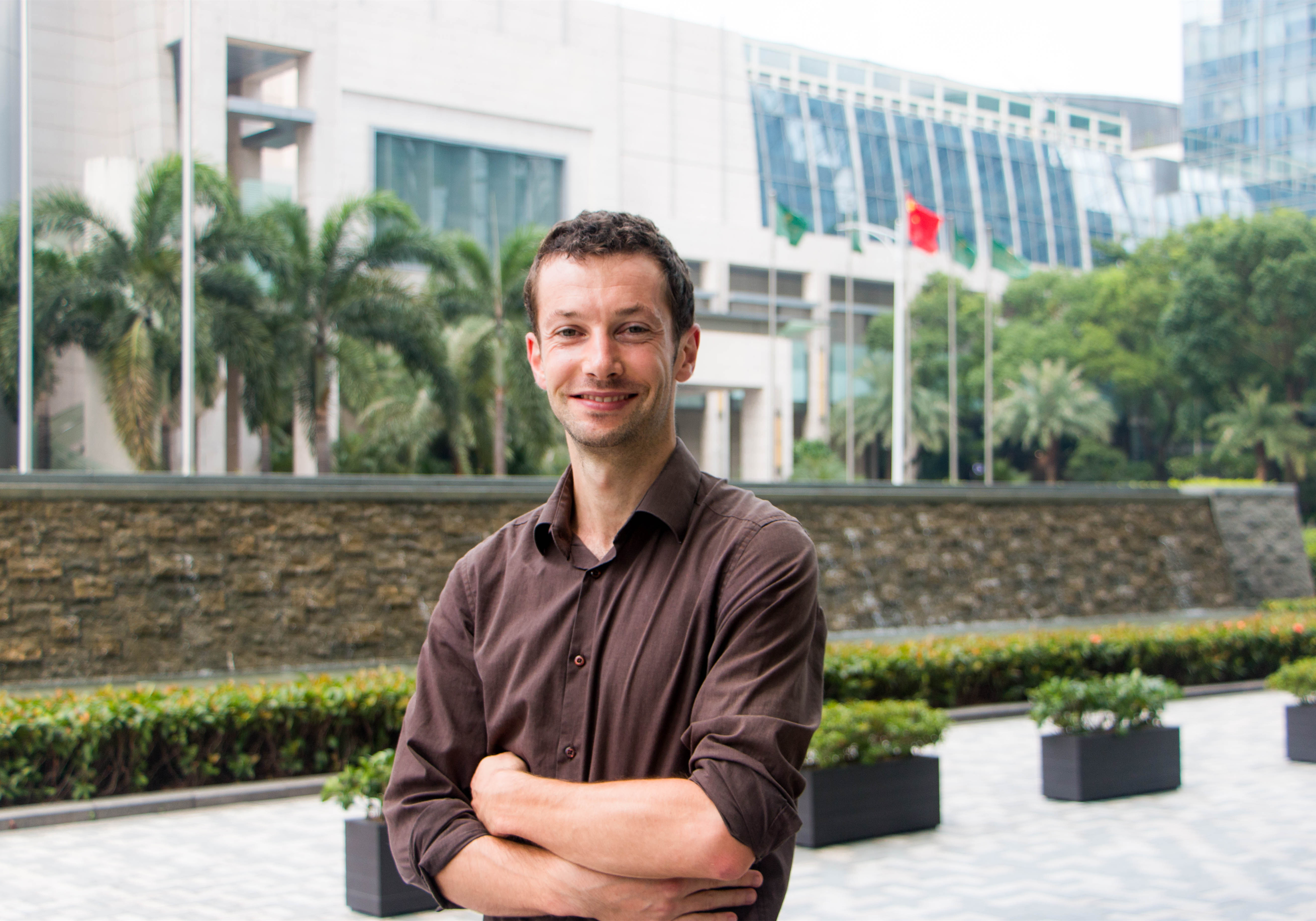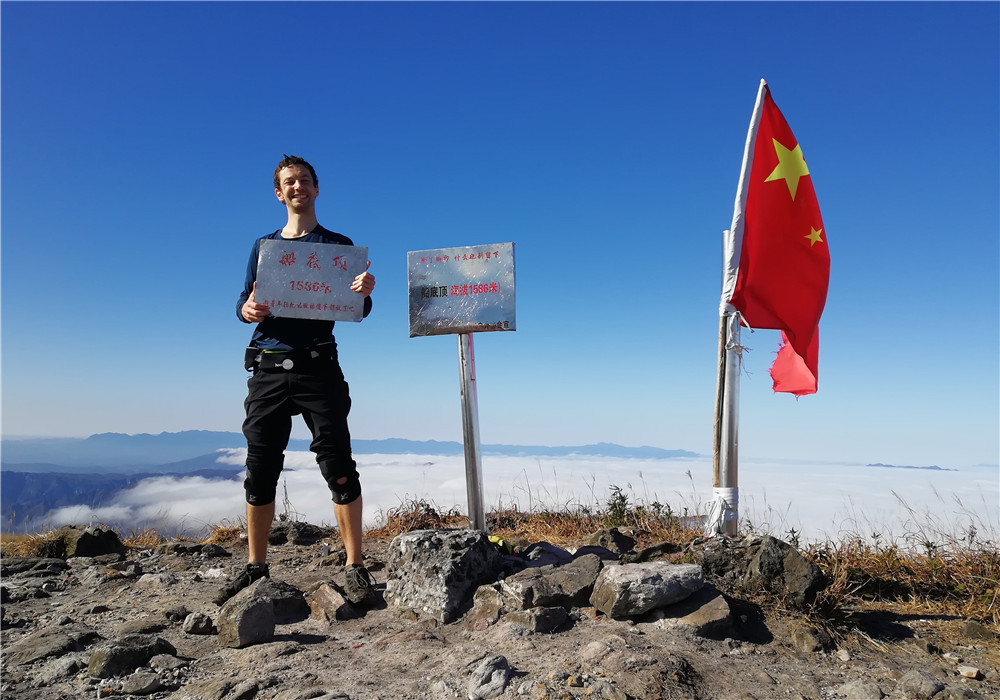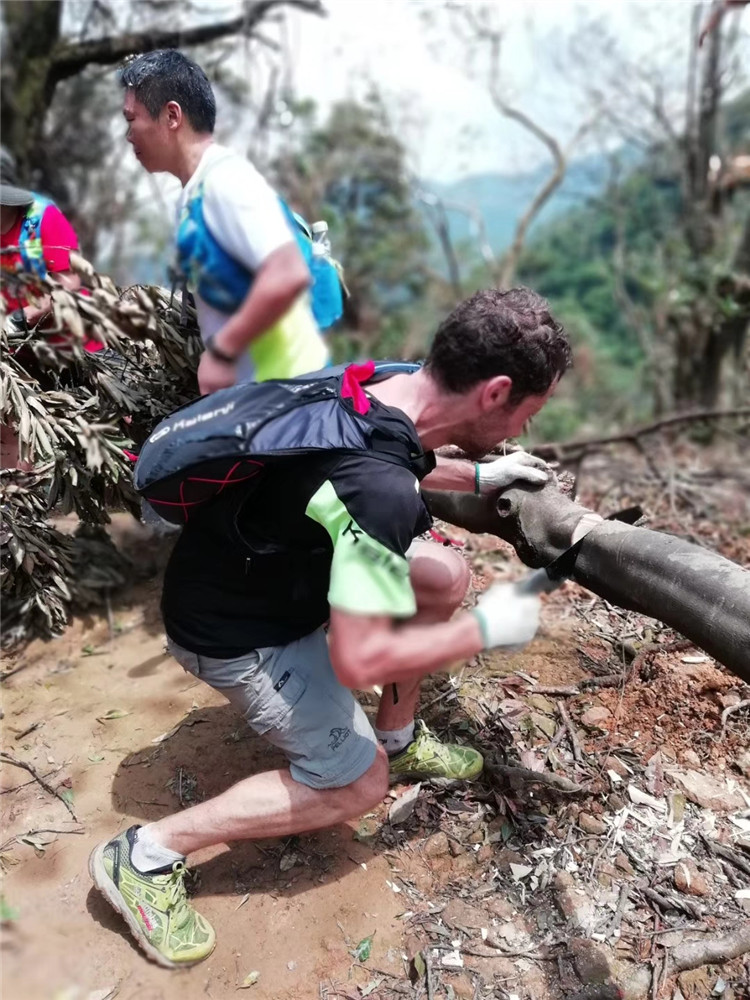Headhunter: More than looking for talent
Writer: Chen Xiaochun | Editor: Jane Chen | From: | Updated: 2018-10-15

Jeremie at Futian Kerry Plaza. Lin Jianping
Email of the writer: 654789759@qq.com
Regularly traveling to different cities in South China and sometimes to Hong Kong to meet hiring companies and candidates the firms are looking for is a normal part of Jeremie Baril’s work routine.
The 29-year-old comes from a small region in southwestern France called Perigord. He came to China over four years ago, first to Beijing and later to Shenzhen.
Baril currently works as a recruitment operations manager responsible for the South China region at Dragonfly Group HR Consulting, a China-centric consulting firm specializing in talent acquisition and human resources development.
“Our Shenzhen office covers other cities in South China as well as Hong Kong. We chose Futian Kerry Plaza for the location of our office, as it is right above the Futian Railway/Metro stations, which offers quick access to the western part of Shenzhen as well as other South China cities and Hong Kong,” explained Baril.
A lover of recruitment
Baril actually entered the HR consulting business by chance. “One of my friends introduced me to a local headhunting company in Beijing. Since then, I have developed a real interest and passion for this line of work,” said Baril.
His current company focuses on helping multinational corporations and foreign SMEs acquire and develop technical experts and local senior managers and executives.
“One part of my job is to convince foreign companies doing business in China that they can rely on us to recruit and develop the right talents for their projects. The other part is to identify, assess and build trust with the candidates that we think would make a difference for our clients,” introduced Baril.
“Whatever the project is, there are cases where, from the first 10 to 15 minutes of my meeting with the candidates, I can tell whether this is exactly the guy I need. But maybe he is not 100 percent on board, so I need to listen carefully to what matters to him or her, and address those issues.”
For the candidates that are not immediately suitable, Baril still engages with them for future projects.
Helping Chinese firms
Apart from serving foreign companies, Baril has also helped Chinese groups operating overseas.
One project he worked on while in Beijing was for a large private Chinese group specializing in agrochemicals that had a very ambitious overseas expansion plan involving entering emerging and developing markets.
Baril’s team managed to connect their client with top professionals from leading European and North American agrochemical companies, and the initial contact with them always went very well. However, difficulties surfaced in the later stages of the process.
“For some projects in western Africa, a few good candidates had a certain idea of their value that sometimes was disconnected from the market standards. During the interview, the client did not comment on the candidates’ package expectations, which made candidates believe that the client agreed to those numbers.”
Baril and his colleagues were then tasked with adjusting both the candidates’ salary expectations and the client’s ideas about a fair price until an agreement was reached between the two sides. Though difficult, they were able to achieve their recruitment targets for most emerging markets on behalf of the client.
Bridging the cultural gap
Apart from recruiting, Baril and his team also provide intercultural training and coaching. “We naturally deliver these types of HR solutions for Eastern and Western middle and senior staff. While training sessions are designed to provide the audience with knowledge and guidance, coaching sessions aim at facilitating the decision-making process by alternating listening-questioning phases so the persons being coached can come up with their own solutions.
Regarding typical cultural differences, Baril mentioned the high sense of hierarchy and verticality that rules Chinese society.
“This has a tremendous impact on the workplace when it comes to the relationship between a subordinate and his or her manager. While in France for instance, we are rather used to open discussion and questioning, it would appear inappropriate in China, although the younger generation has adopted a somewhat different behavior,” said Baril.
Another difference concerns time management. “We work from 9 a.m. to 6 p.m. in both China and France, for instance. However, in China, time is viewed as continuous; what happens outside the working hours also counts, and business and family matters can easily become intertwined. This is less likely to happen in France,” said Baril. “It is thus important never to dissociate the person you are interacting with from his or her cultural background.”
Competitive Chinese candidates
According to Baril, since he started working for Dragonfly Group, over 85 percent of the candidates they have helped hire are Chinese. “There were cases where the client preferred a foreign candidate but ended up hiring a local one, because during our search, we realized the most suitable candidates were local ones,” said Baril. Similar situations, though less frequent, happened when they were initially tasked to give priority to a local candidate.
According to Baril, in most cases Chinese candidates are more cost effective than expats, which is especially true for junior and middle management level positions. Although for senior management and executive roles in first-tier cities, competent local candidates are not less expensive, Baril added.
“Another factor for choosing a local candidate over a foreign one is that local candidates are able to navigate the local country and business culture, which makes an enormous difference,” explained Baril.

Baril is at the top of Chuandiding Mountain in Shaoguan City, Guangdong Province. Courtesy of Jeremie Baril
A passionate hiker
Passionate about outdoor sports, Baril goes hiking basically every weekend, sometimes on both days. He now regularly trains for 40- to 70-kilometer hikes as well as half marathons.
“Shenzhen offers an amazing field for hiking. Being part of the local hiking community is the best thing that could have happened to me in terms of experiences and discoveries. I have met passionate people with great values,” said Baril. After Typhoon Mangkhut hit the city, Baril also joined efforts to clean up the trails on Wutong Mountain with his partners.

Baril helps clean up the Luolongjie trail on Wutong Mountain on Sept. 24 after Typhoon Mangkhut slammed the city. Courtesy of Jeremie Baril
One barrier Baril cited about living in Shenzhen is that his surname is difficult to pronounce for Chinese people. Therefore, a nickname was conferred upon him by the hiking community. He is now affectionately known as “Boluomi,” meaning “jackfruit” in Chinese.